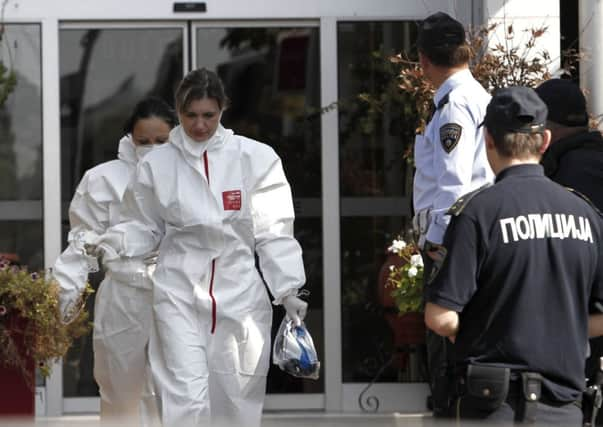Cameron hits back in Ebola ‘shambles’ row


But questions have been raised about the checks, which are to take place at Heathrow, Gatwick and Eurostar rail terminals.
A spokesman for Gatwick said yesterday that the airport had not been given any instructions about how the screening should be carried out.
Advertisement
Hide AdAdvertisement
Hide AdThe news comes as a national exercise to test Britain’s readiness for an Ebola outbreak is due to take place today.
Government Ministers will join dozens of medical professionals from hospitals, the ambulance service and Public Health England for the eight-hour exercise across the country.
Actors will simulate symptoms to test the response of emergency services.
A simulated meeting of the Government’s Cobra emergency committee will also be held, chaired by Health Secretary Jeremy Hunt.
Advertisement
Hide AdAdvertisement
Hide AdThe exercise was ordered by Mr Cameron as part of the UK’s contingency plan against Ebola, which has killed more than 4,000 people in west Africa.
But the decision to introduce screening at major airports and terminals has been criticised by health experts.
Labour MP Keith Vaz said the lack of precise information available about the screening was “shambolic”.
Mr Vaz, who is chairman of the Home Affairs Select Committee, said he welcomed the introduction of targeted screening because it “puts us on the same page as the Americans and South Africans”.
Advertisement
Hide AdAdvertisement
Hide AdHe added: “However, what we need very, very quickly indeed is clarity as to precisely what these proposals are.
“There is a touch of the shambolic about the way this is being handled and what is needed now is certainty.”
Professor George Griffin, chair of the Government’s Advisory Committee on Dangerous Pathogens, said he was surprised that screening was being introduced after being led to believe it would not be.
Speaking on a constituency visit to Chipping Norton, Oxfordshire, Mr Cameron said the Government was “taking all the steps we can” to prevent an Ebola outbreak in the UK.
Advertisement
Hide AdAdvertisement
Hide AdHe added: “What we do is listen to the medical advice and we act on that advice, and that’s why we are introducing the screening processes at the appropriate ports and airports.
“What we are focusing on as a country is taking action right across the board to deal with this problem at source.”
David Mabey, professor of communicable diseases at the London School of Hygiene and Tropical Medicine, criticised the screening as a “complete waste of time”.
“Firstly, there won’t be anyone coming from these (West African) countries because all direct flights have been cancelled,” he said.
Advertisement
Hide AdAdvertisement
Hide Ad“Are they going to screen everyone from Brussels, Paris, Frankfurt and Amsterdam? That would lead to a lot of delays and disruption.
“Secondly, why would anyone admit that they have been in contact with someone when they’re in a hurry to get through immigration control when they arrive at the airport?”
Downing Street said the tests will be introduced for passengers travelling from the main Ebola-affected regions in west Africa – Liberia, Sierra Leone and Guinea – where the death toll has reportedly risen to nearly 4,000.
The screening is expected to involve assessing passengers’ recent travel history, who they have been in recent contact with, and their onward travel arrangements.
The introduction of screening comes after a British man died in Macedonia with symptoms similar to Ebola, although Public Health England said it was “unlikely” that the death was caused by the virus.